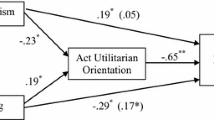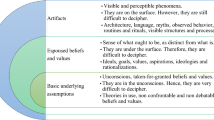Abstract
This article reports the results of a cross-cultural empirical study across seven countries which investigates the differences in the way managers structure their ethical judgements regarding the loyalty of a corporation to its employees, the loyalty of employees to the corporation, and the loyalty of employees towards their co-workers. Managers' ethical judgements from the East Asian ‘tiger’ countries of Japan, Korea and Hong Kong are compared with those from the ‘Anglo’ countries of the United States and Australia, and with those from the ‘transitional’ countries of Asiatic Russia and Poland. An adapted version of the well documented Reidenbach-Robin instrument is used, and its cross-cultural application investigated. As hypothesized, cross-cultural differences were indicated for both the structure and content of managers' ethical judgements, which have important implications for the way organizations are effectively managed both nationally, regionally and internationally. Weaknesses in the a priori constructs of the research instrument were also indicated, and recommendations made for future development of methodology in this area.
Similar content being viewed by others
REFERENCES
Alderson, S. and Kakabadse, A. 1994. Business ethics and Irish management: A cross-cultural study. European Management Journal, 12(4): 432–40.
Allport, G.W. 1962. The general and the unique in psychological science, Journal of Personality, 30: 405–22
Apressyan, R.G. 1997. Business ethics in Russia. Journal of Business Ethics, 16: 1561–70.
Bae, K. and Chung, C. 1997. Cultural values and work attitudes of Korean industrial workers in comparison with those of the United States and Japan. Work and Occupations, 24(1): 80–96.
Becker, H. and Fritzsche, D.J. 1987a. Business ethics: a cross-cultural comparison of managers' attitudes. Journal of Business Ethics, 6: 289–95.
Becker, H. and Fritzsche, D.J. 1987b. A comparison of the ethical behavior of American, French and German managers. Columbia Journal of World Business, Winter: 87–95.
Berry, J.W., Poortinga, Y.H., Segall, M.H. and Dasen, P.R. 1992. Cross-cultural Psychology. Research and Applications. New York: Cambridge University Press.
Brady, F.N. 1990. Ethical Management: Rules and Results. London: MacMillan.
Child, C. 1990. The Essentials of Factor Analysis. 2nd Edition. London: Casell.
Cronbach, L. 1990. Essentials of Psychological Testing. 5th Edition. New York: Harper Collins.
Dolecheck, M. and Dolecheck, C. 1987. Business ethics: A comparison of attitudes of managers in Hong Kong and the United States. Hong Kong Managers, 1: 28–43.
Elenkov, D.S. 1997. Differences and similarities in managerial values between U.S. and Russia managers. International Studies of Management and Organization. 27(1): 85–106.
Fransella, F. and Bannister, D. 1977. A Manual for Repertory Grid Technique. London: Academic Press.
Glenn, E.S., Witmeyer, D. and Stevenson, K.A. 1984. Cultural styles of persuasion. International Journal of Intercultural Relations: 1.
Hansen, R.S. 1992. A multidimensional scale for measuring business ethics: a purification and refinement. Journal of Business Ethics, 11: 523–34.
Hegarty, W.H. and Sims, H.P. 1978. Some determinants of unethical decision behavior: an experiment. Journal of Applied Psychology, 63(4): 451–57.
Hegarty, W.H. and Sims, H.P. 1979. Organizational philosophy, policies and objectives related to unethical decision behavior: A laboratory experiment. Journal of Applied Psychology, 64(3): 331–38.
Hisrich, R.D. and Jankowicz, A.D. 1990. Intuitive venture capital decisions: An exploratory study using a new technique. Journal of Business Venturing, 5: 49–62.
Hofstede, G. 1980. Culture's Consequences: International Differences in Work-related Values. Beverly Hills: Sage.
Hui, C.H. 1990. Work attitudes, leadership styles and managerial behavior in different cultures. In R. W. Brislin, Applied Cross-cultural Psychology. Newbury Park, CA: Sage.
Hunt, S.D. and Vitell, S.J. 1986. A general theory of marketing ethics. Journal of Macromarketing, 6: 5–16.
Izraeli, D. 1988. Ethical beliefs and behaviors among managers: A cross-cultural comparison. Journal of Business Ethics, 7: 263–71.
Jackson, T. 2000. Management ethics and corporate policy: A cross-cultural comparison. Journal of Management Studies, 37(3): 349–69.
Jackson, T. and Calafell Artola, M. 1997. Ethical beliefs and management behavior: A cross-cultural comparison. Journal of Business Ethics, 16: 1163–73.
Kelly, G.A. 1955. The Psychology of Personal Constructs. New York: Norton.
Kline, P. 1986. A Handbook of Test Construction: Introduction to Psychometric Design. London: Methuen.
Lonner, W.J. 1990. An overview of cross-cultural testing and assessment. In R. W. Brislin (ed) Applied Cross-cultural Psychology, pp. 57–76. Newbury Park, CA: Sage.
Lyonski, S. and Gaidis, W. 1991. A cross-cultural comparison of the ethics of business students. Journal of Business Ethics, 10: 141–50.
McDonald, G.M. and Park, C.K. 1997. Ethical perception of expatriates and local managers in Hong Kong. Journal of Business Ethics, 16: 1605–23.
Nakano, C. 1997. A survey study on Japanese managers' views of business ethics, Journal of Business Ethics, 16: 1737–51.
Neimanis, G.J. 1997. Business ethics in the former Soviet Union: A report. Journal of Business Ethics, 16: 357–62.
Okleshen, M. and Hoyt, R. 1996. A cross-cultural comparison of ethical perspectives and decision approaches of business students: United States of America versus New Zealand. Journal of Business Ethics, 15: 537–49.
Pickens, S.D.B. 1987. Values and value related strategies in Japanese corporate culture, Journal of Business Ethics, 6: 137–43.
Posner, B.Z. and Schmidt, W.H. 1987. Ethics in American companies: A managerial perspective. Journal of Business Ethics. 6: 383–91.
Ralston, D.A., Gaicalone, R.A. and Terpstra, R.H. 1994. Ethical perceptions of organizational politics: a comparative evaluation of American and Hong Kong managers. Journal of Business Ethics, 13: 989–99.
Rawls, J. 1971. A Theory of Justice. Cambridge, MA: Harvard University Press.
Reidenbach, R.E. and Robin, D.P. 1988. Some initial steps towards improving the measurement of ethical evaluation of marketing activities. Journal of Business Ethics, 7: 871–9.
Reidenbach, R.E. and Robin, D.P. 1990. Towards the development of a multidimensional scale for improving evaluations of business ethics. Journal of Business Ethics, 9: 639–53.
Ronen, S. and Shenkar, O. 1985. Clustering countries on attitudinal dimensions: a review and synthesis. Academy of Management Review, 10(3): 435–54.
Rust, J. and Golombok, S. 1989. Modern Psychometrics: The Science of Psychological Assessment, London: Routledge.
Schlegelmilch, B.B. and Robertson, D.C. 1995. The influence of country and industry on ethical perceptions of senior executives in the U.S. and Europe. Journal of International Business Studies: 859–881.
Schwartz, S. 1994. Beyond individualism and collectivism: new cultural dimensions of values. In U. Kim, H.C. Triandis, C. Kagitcibasi, S-C. Choi, and G. Yon, Individualism and Collectivism: Theory, Method and Application, pp. 85–119. Beverly Hills: Sage.
Singhapakdi, A., Vitell, S.J. and Leelakulthanit, O. 1994. A cross-cultural study of moral philosophies, ethical perceptions and judgements: A comparison of American and Thai marketers, International Marketing Review, 11(6): 65–78.
Taka, I. and Dunfee, T.W. 1997. Japanese moralogy as business ethics. Journal of Business Ethics, 16: 507–19.
Tsalikis, J. and LaTour, M.S. 1995. Bribery and extortion in international business: ethical perceptions of Greeks compared to Americans. Journal of Business Ethics, 14: 249–64.
Tsalikis, J. and Nwachukwu, O. 1991. A comparison of Nigeria to American views of bribery and extortion in international commerce, Journal of Business Ethics, 10: 85–98.
Van de Vijver, F. and Leung, K. 1997. Methods and Data Analysis for Cross-cultural Research. Thousand Oaks, CA: Sage.
Westwood, R.J. and Posner, B.Z. 1997. Managerial values across cultures: Australia, Hong Kong and the United States. Asia Pacific Journal of Management, 14: 31–66.
White, L.P. and Rhodeback 1992. Ethical dilemmas in organizational development: A cross-cultural analysis. Journal of Business Ethics, 11: 663–70.
Author information
Authors and Affiliations
Rights and permissions
About this article
Cite this article
Jackson, T., David, C., Deshpande, S. et al. Making Ethical Judgements: A Cross-Cultural Management Study. Asia Pacific Journal of Management 17, 443–472 (2000). https://doi.org/10.1023/A:1015838432317
Issue Date:
DOI: https://doi.org/10.1023/A:1015838432317




